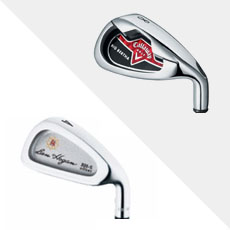Forged Vs Cast Irons

There is always heated debate around the clubhouse over which is better forged irons or cast irons. With technology today it can be difficult to even tell the difference between them just by looking. At one time forged irons were the sole providence of low handicap and professional level golfers and they were always muscle back clubs that offered little or no forgiveness. Cast irons were traditionally irons used by beginning players who needed a lot of assistance in getting a good shot. Those lines have become blurred to a great extent now. While both forged and cast irons offer many of the same elements and are used by all levels of golfers some differences still hold true.
The Physical Difference
The difference between forged irons and cast irons is the way they are created. Forged irons are molded from one solid block of malleable metal and then pounded into exact shape and finally ground and milled with various grooves and lettering to finish the process. Cast irons are created in one fell swoop by pouring liquefied metal into a die cast that forms the club including all grooves, screw slots and holes for cavities and weights, lettering and insignias.
Once both types of club heads are through their individual processes they both go through similar finishing touches as far as shafts and grips are concerned which has led to a lot of confusion over the differences between them. Advanced technologies in shafts have given even forged irons more forgiving natures and cast iron clubs more power.
The Real Difference
The real difference isn’t as much in how the irons are made, however, as in how they are played. Forged irons are made with a less forgiving nature as a rule thanks to a relatively small sweet spot that requires good aim, steady swing, and controlled contact. The forged irons have long been considered an advanced iron for that reason. The unforgiving nature of the forged iron would seem at first thought to make them less desirable but when a golfer has learned how to get the most out of their own performance a club that offers them better control, and more feedback to help them understand the imperfections that still exist in their game can be a great benefit.
Even though forged irons are now often made with as many technological advanced in game improving techniques such as cavity backs, sling backs, and varying weight systems they still offer a lot of trouble for a high handicap golfer.
Cast irons have a much more forgiving nature and high handicap golfers can get better performance out of them when their own form is less than perfect. They also are more comfortable to use because they have less vibration when mishit and will often times still deliver a good flight no matter how the ball is hit. They have a much larger sweet spot so mishits are less common and usually have many game improvement qualities to help stabilize a player’s swing and contact.
How do you know which iron is right for you?
Most golfers know deep down when their game is not up to a more difficult iron. The tendency to want to be better than their game proves they are, however, often tempts players to go for clubs that are beyond their abilities. Those are the times you will most often hear a club being maligned as less than what the manufacturers claim they are. In reality, manufacturers go to great lengths to describe the real qualities of their clubs and how they will work for each individual player.
If you have not developed the stability to gain mid handicap levels you most likely are safer sticking to a cast iron set as you develop your skills further. Once you begin to reach lower scores it is a good idea to begin the switch to an advanced club gradually. You are likely to gain points for awhile as you adjust to the new clubs. That is to be expected and as you learn to handle the different qualities of a forged iron and how to control your own hits your handicap will lower once more and even improve.
Whenever you have the chance to try out different brands do so. This is the best way to see how clubs feel and react to your style of playing. Read lots of reviews on the various irons to see what others have to say about them and visit our review pages for added information on the different makes and models of both forged and cast iron clubs.
The debate over which is best, forged or cast irons, may never end. What really matters is what is best for you and your game at any particular time that makes a club work or not. Make your decisions based on your own needs not on what others think is hot or superior and you will get the most out of your own game every time.
Further Discussions
Forged Forgiveness
Forged Vs Cast
Some Info On Forged Irons
Cast Vs Forged